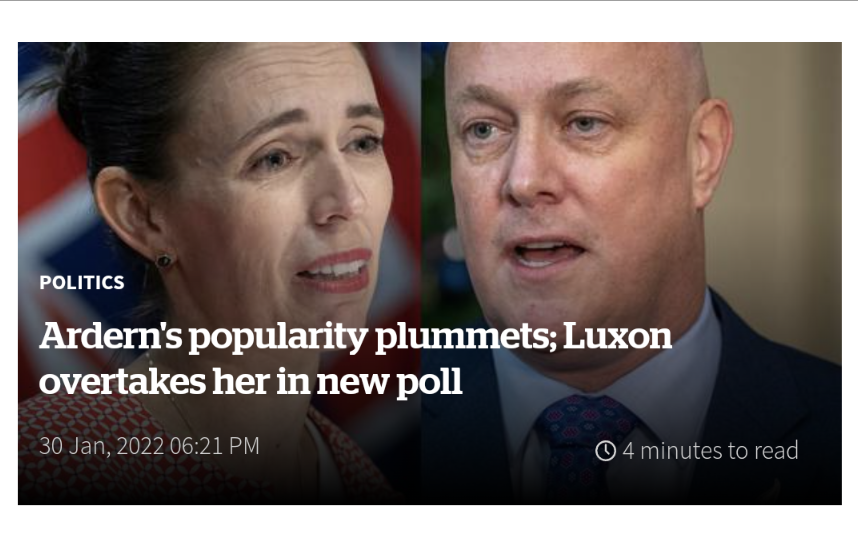Net approval
There has been quite a bit of fuss on Twitter about this headline, and to a lesser extent the reporting it leads to. The controversy is over the ‘net approval’ metric — proportion approving minus proportion disapproving — which is relatively new in NZ politics (and which is annoying not in the “full results” summary of the 1News Kantar poll at 1News). You might not guess from the headline that the poll gives Labour+Greens a majority in Parliament and Ardern twice the “preferred PM” percentage of anyone else.
Net approval is a commonly-reported summary for polls about the US president. According to Wikipedia, it dates back to 1937. That in itself is valuable for the US — continuity makes it easier to do long-term comparisons — and attitudes to the President, separately from his party, seem to be a useful aspect of public mood to measure. In the US, it isn’t usual to compare the net approval of the President and the Leader of the Opposition; they don’t have one. You do sometimes get net approval ratings for Presidential candidates, but they seem to be less common that just ‘approval’ or ‘would vote for’ or more detailed breakdowns.
There’s a weaker case for personal approval ratings here than in the US, since people don’t vote for a Prime Minister separately from a party — if anything, it might be more interesting to get personal approval for electorate MPs — but it’s not irrelevant. You could argue, and some of the people complaining certainly did, that Jacinda Ardern has made her party more popular than it would be under Generic Replacement Prime Minister, and that Judith Collins made her party less popular than it would have been under Generic Replacement Leader. That’s a meaningful question on which net approval provides some limited data, in a different way than “preferred Prime Minister” does. However, I would argue that net personal approval is more useful as a comparison over time than a comparison between government and opposition, because the level of “Don’t Care” will intrinsically tend to be higher for leaders who aren’t actually in government. As the Herald says
Just 10 per cent gave no answer or said they didn’t know, which is probably to be expected given Ardern has been Prime Minister for four years – most people have an opinion on her.
I’ve got no problem with net approval being reported. It’s definitely true that it has gone down for Ardern, though it’s not clear how much is a reduction in approval and how much is an increase in disapproval. I don’t think the headline is appropriate given how new ‘net approval’ is, and given the problems of comparing opposition and government net approval. It’s clear that Luxon’s approval is up, and that National’s support is up, though more at the expense of ACT than Labour. The second headline, if you click through from the front page, is more reasonable — Jacinda Ardern’s personal approval rating plummets in new 1News poll, but Christopher Luxon won’t be getting too excited — though even there I’d be happier if the headline was about one of the familiar metrics or at least said ‘net’.
Thomas Lumley (@tslumley) is Professor of Biostatistics at the University of Auckland. His research interests include semiparametric models, survey sampling, statistical computing, foundations of statistics, and whatever methodological problems his medical collaborators come up with. He also blogs at Biased and Inefficient See all posts by Thomas Lumley »

Herald is always going to frame its stories as negatives for Ardern, its their schtick now.
However its unusual for a major newspaper to have caught the ‘derangement syndrome’ bug.
3 years ago